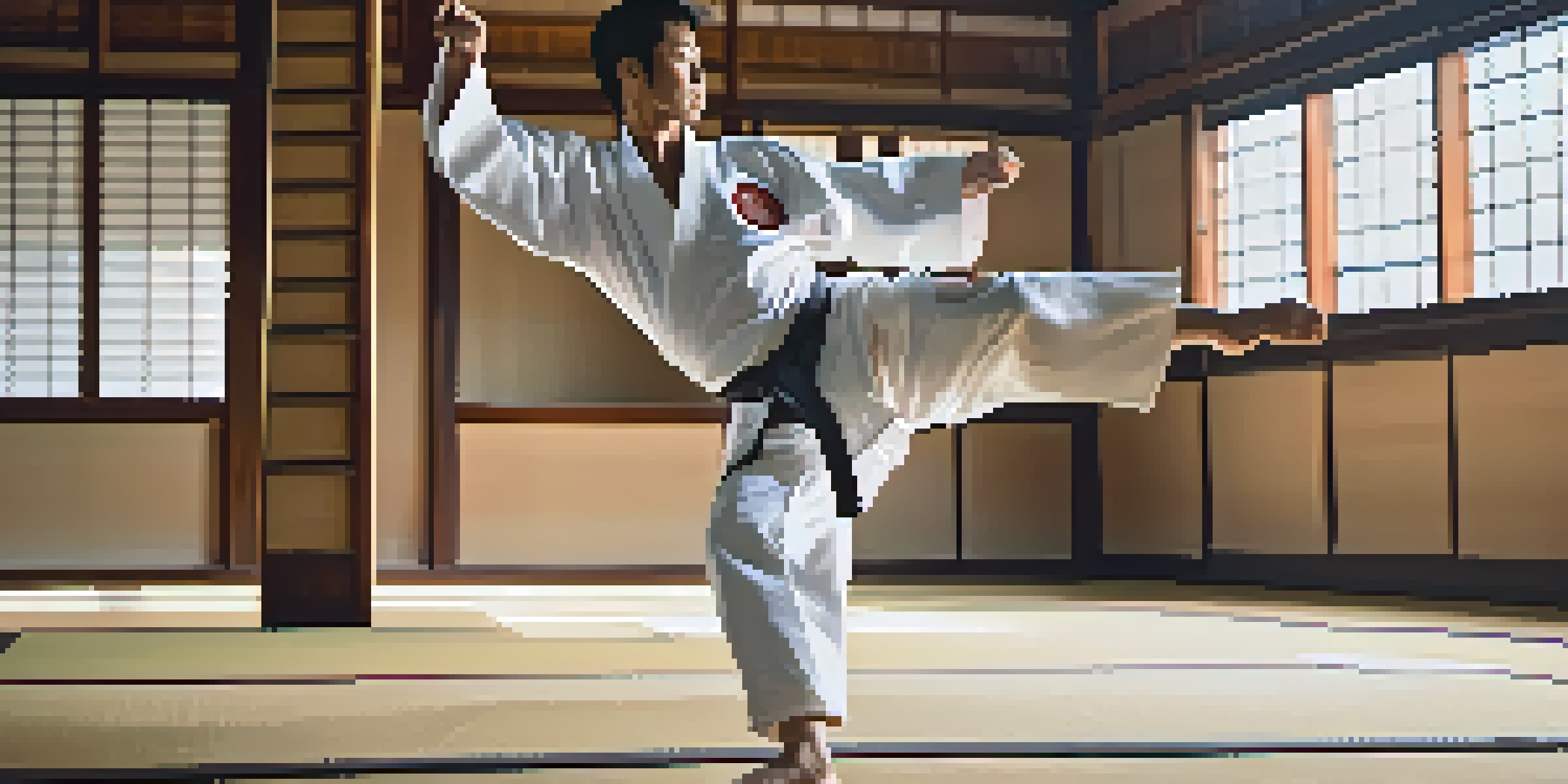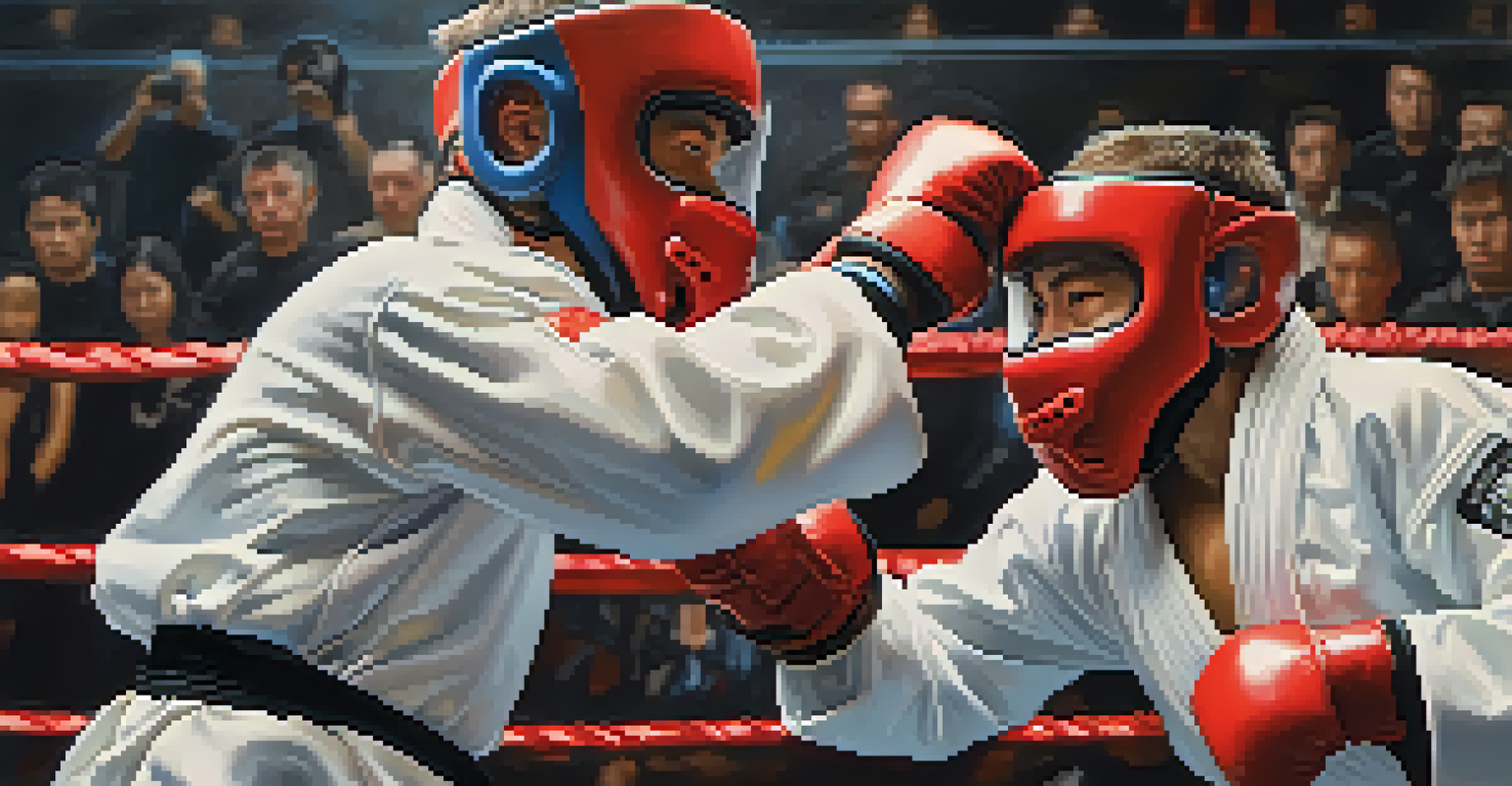Progressive Training: Advancing Skills in Martial Arts Practice

Understanding Progressive Training in Martial Arts
Progressive training is a structured approach that focuses on gradually increasing the complexity of skills in martial arts. This method allows practitioners to build a strong foundation before moving on to more advanced techniques. By progressing step-by-step, martial artists can enhance their overall performance and confidence.
The journey of a thousand miles begins with one step.
Imagine learning to ride a bicycle: first, you balance, then you pedal, and finally, you navigate turns. Similarly, in martial arts, mastering basic movements lays the groundwork for sophisticated maneuvers. This training philosophy not only improves physical skills but also fosters mental resilience through consistent practice.
Incorporating progressive training into your routine can transform your practice, making it more effective and enjoyable. Whether you're a beginner or an experienced martial artist, this method can help you achieve your goals while minimizing the risk of injury.
The Importance of Skill Assessment and Goal Setting
Before diving into progressive training, it's essential to assess your current skill level and set clear, achievable goals. This assessment acts as a roadmap, guiding your training journey and enabling you to track your progress effectively. For instance, if your goal is to improve your sparring technique, identify specific areas to focus on, such as footwork or timing.

Setting SMART goals—Specific, Measurable, Achievable, Relevant, and Time-bound—can significantly enhance your training experience. For example, instead of vaguely stating you want to 'get better at kicks,' aim to 'execute ten consecutive high roundhouse kicks by the end of the month.' This clarity boosts motivation and keeps you accountable.
Progressive Training Builds Skills
Progressive training gradually increases skill complexity, helping martial artists develop a strong foundation and confidence.
Remember, progress isn’t always linear. Celebrate small victories along the way, as they contribute to your overall development. By regularly reassessing your skills and adjusting your goals, you’ll maintain a sense of direction and purpose in your martial arts practice.
Building a Solid Foundation: Fundamental Techniques
The journey of progressive training begins with mastering fundamental techniques. These basics serve as the building blocks for more advanced skills, ensuring that you have the strength and coordination needed to execute complex moves. Whether it’s stances, strikes, or blocks, focusing on these essentials is crucial for long-term success.
Success is the sum of small efforts, repeated day in and day out.
Think of it like constructing a house: a sturdy foundation prevents future problems. In martial arts, having a strong grasp of basic techniques helps prevent injuries and allows for smoother transitions into more challenging practices. Regularly revisiting these fundamentals keeps your skills sharp and reinforces muscle memory.
Incorporate drills that emphasize these foundational techniques into your training routine. For example, spending dedicated time on footwork can improve your agility and reaction times, making you a more formidable opponent in sparring sessions. The more solid your base, the more confidently you can explore advanced techniques.
Incorporating Sparring to Enhance Skills Progressively
Sparring is an essential element of martial arts training that allows practitioners to apply learned techniques in a dynamic environment. It’s a practical way to test your skills, adapt to real-time situations, and understand the nuances of combat. Through sparring, you gain invaluable experience that can’t be replicated through solo practice.
However, sparring should also be approached progressively. Start with light sparring sessions to focus on technique and timing before gradually increasing intensity. This gradual exposure helps reduce anxiety and builds confidence, allowing you to engage more effectively during full-contact sessions.
Set Clear Goals for Success
Assessing your skills and setting SMART goals provide a roadmap for tracking progress and enhancing your training experience.
Additionally, consider sparring with different partners to experience various styles and approaches. This diversity enriches your learning, forcing you to adapt and think critically under pressure. Embracing this progressive approach to sparring will ultimately elevate your martial arts skills.
The Role of Conditioning in Progressive Training
Physical conditioning is a pivotal aspect of progressive training in martial arts. Building strength, endurance, and flexibility enhances your ability to execute techniques with precision and power. Conditioning prepares your body for the demands of training, making it a necessary complement to skill development.
Think of conditioning as the engine that powers your martial arts performance. Just like a car needs fuel to run smoothly, your body requires a solid fitness foundation to support technical skills. Incorporate exercises such as running, weight training, and flexibility drills into your routine to ensure you’re physically prepared for the rigors of martial arts.
Moreover, conditioning should also progress in intensity and complexity. As you advance in your training, so should the challenges you set for yourself. This progressive approach to conditioning not only enhances your physical capabilities but also boosts your overall confidence in your martial arts journey.
Mental Training: Cultivating Focus and Resilience
Martial arts isn't just about physical prowess; mental training plays an equally critical role in your development. Cultivating focus and resilience allows you to overcome challenges and push through difficult training sessions. Incorporating mental exercises, such as visualization and mindfulness, can significantly enhance your performance.
Consider how elite athletes often visualize their performances before competitions. This mental rehearsal prepares them for success and helps reduce anxiety. In martial arts, taking time to visualize your techniques or sparring sessions can reinforce your learning and boost your confidence when it comes time to perform.
Conditioning Enhances Performance
Physical conditioning is essential for executing techniques effectively and should progress alongside skill development.
Additionally, resilience is key in martial arts training. Accepting that setbacks are part of the journey enables you to learn and grow from your experiences. By incorporating mental training into your progressive routine, you’ll develop a well-rounded skill set that encompasses both physical and psychological strength.
Tracking Progress and Adapting Training Methods
As you embark on your progressive training journey, tracking your progress is vital for continuous improvement. Keeping a training journal or using apps can help you document your achievements, set new goals, and reflect on your experiences. This practice not only boosts motivation but also offers insights into your strengths and areas for growth.
Adapting your training methods based on your progress is equally important. If you find certain techniques challenging, don’t hesitate to modify drills or seek guidance from instructors. Embracing flexibility in your training approach ensures that you remain engaged and motivated while addressing any obstacles that come your way.

Remember, progress looks different for everyone. By regularly evaluating your skills and adjusting your training methods, you can maintain a personalized approach that keeps you inspired and moving forward in your martial arts practice.